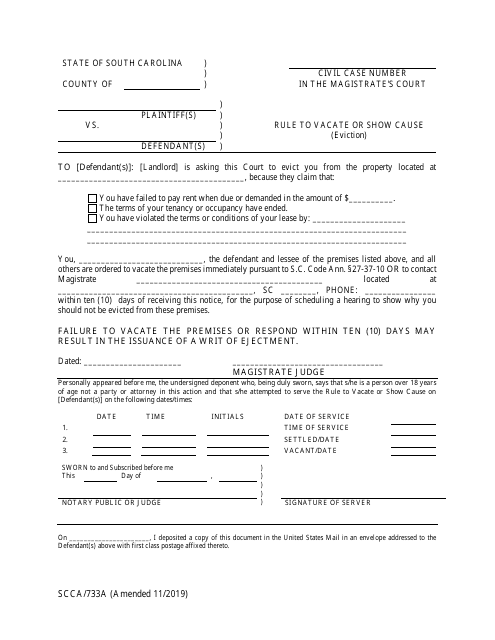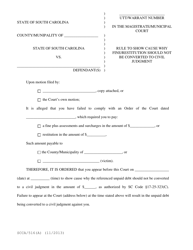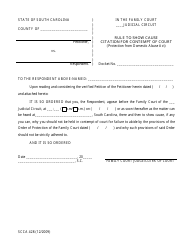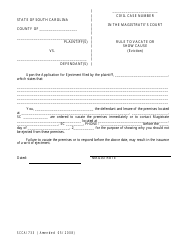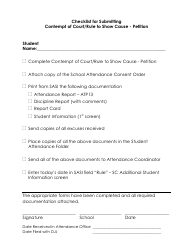Form SCCA / 733A Rule to Vacate or Show Cause (Eviction) - South Carolina
What Is Form SCCA/733A?
This is a legal form that was released by the South Carolina Judicial Department - a government authority operating within South Carolina. As of today, no separate filing guidelines for the form are provided by the issuing department.
FAQ
Q: What is the SCCA/733A Rule to Vacate or Show Cause?
A: The SCCA/733A Rule to Vacate or Show Cause is a legal procedure used in South Carolina for eviction cases.
Q: What is the purpose of the SCCA/733A Rule?
A: The purpose of the SCCA/733A Rule is to initiate eviction proceedings and require the tenant to either vacate the premises or show cause for why they should not be evicted.
Q: Who can initiate the SCCA/733A Rule?
A: Landlords or property owners can initiate the SCCA/733A Rule to start eviction proceedings against a tenant.
Q: What is the process for the SCCA/733A Rule?
A: The process involves serving the tenant with a Rule to Vacate or Show Cause, which requires the tenant to either vacate the premises or appear in court to show cause for why they should not be evicted.
Q: What happens if the tenant fails to comply with the SCCA/733A Rule?
A: If the tenant fails to comply with the SCCA/733A Rule, the landlord can proceed with the eviction process and seek a court order for the tenant to be evicted.
Q: Can a tenant challenge the SCCA/733A Rule?
A: Yes, a tenant has the right to appear in court and present a defense or argument against the eviction.
Q: What are the possible outcomes of an SCCA/733A Rule hearing?
A: The possible outcomes of an SCCA/733A Rule hearing include the tenant vacating the premises voluntarily, the tenant showing cause for why they should not be evicted, or the court granting an eviction order.
Q: Is legal representation necessary for the SCCA/733A Rule hearing?
A: While legal representation is not required, it is recommended for both landlords and tenants to seek legal advice for the SCCA/733A Rule hearing.
Form Details:
- Released on November 1, 2019;
- The latest edition provided by the South Carolina Judicial Department;
- Easy to use and ready to print;
- Quick to customize;
- Compatible with most PDF-viewing applications;
- Fill out the form in our online filing application.
Download a printable version of Form SCCA/733A by clicking the link below or browse more documents and templates provided by the South Carolina Judicial Department.
